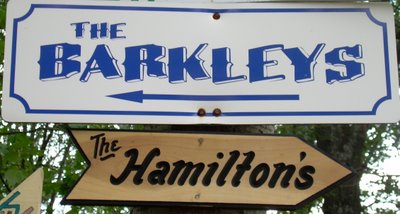Northern Michigan's Assault on the Apostrophe
OR: The Barkleys vs. the Hamilton's

LAKE GEORGE, Mich.—Signs like these are cherished details of the lake life Up North in Michigan. Just about everybody's cottage has a whimsical sign announcing who has a pontoon on the lake and a barbecue on the back deck. Sadly, many of these markers are also soldiers in the war against proper apostrophe use.
Consider the above signs. The top sign announces that the Barkleys — plural of Barkley, a family of people with the last name of Barkley — live in a cabin to the left. But the bottom sign, what does that say? Something belonging to "the Hamilton" — singular — is to the right? Why the apostrophe?
Because too many folks incorrectly think the apostrophe denotes a plural. Folks, this one is easy: Apostrophes denote possession and contraction, period (there are rare instances when they can denote plurals, but we'll discuss that in a later conversation). If the cabin to the right belongs to more than one Hamilton, all we need is to add an "s" to "Hamilton." No possession needed. Anyway, if they were meaning to denote possession, the apostrophe would come after the "s" — to let people know that the cabin belongs to more than one Hamilton.
Pat, is that SNOOTy enough for you?

LAKE GEORGE, Mich.—Signs like these are cherished details of the lake life Up North in Michigan. Just about everybody's cottage has a whimsical sign announcing who has a pontoon on the lake and a barbecue on the back deck. Sadly, many of these markers are also soldiers in the war against proper apostrophe use.
Consider the above signs. The top sign announces that the Barkleys — plural of Barkley, a family of people with the last name of Barkley — live in a cabin to the left. But the bottom sign, what does that say? Something belonging to "the Hamilton" — singular — is to the right? Why the apostrophe?
Because too many folks incorrectly think the apostrophe denotes a plural. Folks, this one is easy: Apostrophes denote possession and contraction, period (there are rare instances when they can denote plurals, but we'll discuss that in a later conversation). If the cabin to the right belongs to more than one Hamilton, all we need is to add an "s" to "Hamilton." No possession needed. Anyway, if they were meaning to denote possession, the apostrophe would come after the "s" — to let people know that the cabin belongs to more than one Hamilton.
Pat, is that SNOOTy enough for you?

